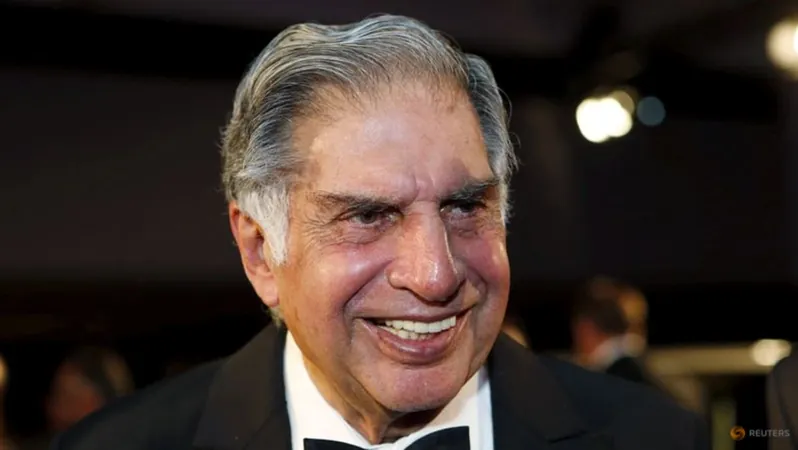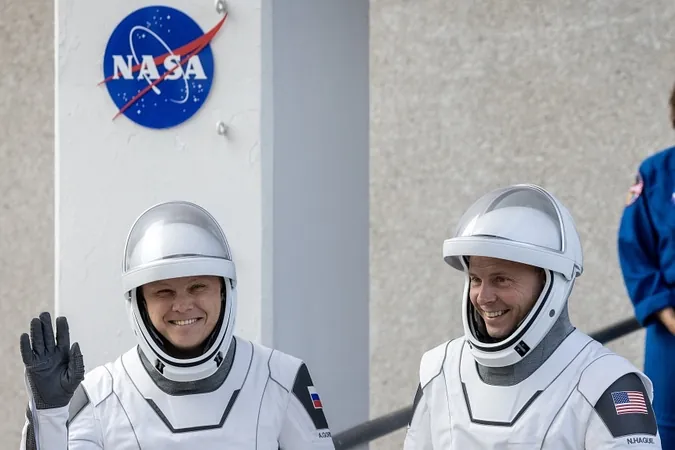
Ratan Tata: The Visionary Leader Who Transformed India’s Tata Group, Has Passed Away at 86
2024-10-09
Author: Wei Ling
Ratan Tata, the former chairman of the Tata Group, passed away on October 9, at the age of 86. His legacy as a transformative leader who catapulted the Indian conglomerate onto the global stage through bold acquisitions is unparalleled. The Tata Group confirmed the news through a heartfelt statement, expressing profound loss over the passing of “Mr. Ratan Naval Tata, a truly uncommon leader.”
Having been hospitalized for intensive care in Mumbai, Tata's contributions have long left an indelible mark, not just on the Tata Group but on the very fabric of India. Indian Prime Minister Narendra Modi paid tribute to Tata on social media, calling him a “visionary business leader” and expressing deep sorrow over his demise.
Ratan Tata's journey began with his education in architecture at Cornell University. He returned to India in 1962 to join the family business founded by his great-grandfather almost a century prior. Over the years, Tata worked across several enterprises in the group, including Telco (now Tata Motors) and Tata Steel, making critical turns when he led the National Radio & Electronics Company back from the brink of losses.
He took the chairmanship in 1991, a pivotal moment coinciding with India's economic reforms that opened up new horizons. His leadership ethos included modernizing the management structure by enforcing retirements and promoting younger talent, thereby reshaping the corporate landscape in India.
Under his guidance, the Tata Group began expanding its footprint beyond India. Notable acquisitions included British tea company Tetley in 2000, Anglo-Dutch steelmaker Corus in 2007, and luxury automobile brands Jaguar and Land Rover in 2008. These moves marked India's emergence on the global business map, signaling a new era of Indian entrepreneurship.
Tata also spearheaded innovative projects at Tata Motors, including the Indica—the first passenger car designed and produced in India—and the Nano, which was once hailed as the world's most affordable car. While the Indica became a commercial triumph, the Nano faced challenges due to safety concerns and marketing missteps, leading to its discontinuation a decade post-launch.
Though he never married, Ratan Tata was known for his humility and passion for philanthropy, with about two-thirds of the share capital of Tata Sons held by charitable trusts. His philanthropic footprint reached far and wide, supporting numerous initiatives in education, healthcare, and rural development.
His tenure was not without strife. A notorious feud arose when Cyrus Mistry was ousted as chairman of Tata Sons in 2016, leading to public disputes over management and control of the conglomerate. Mistry's removal was accompanied by accusations of interference against Tata, revealing the complexities of leadership within such a vast organization.
Following his retirement, Tata became a prominent figure in the Indian startup ecosystem, investing in various ventures, including fintech leader Paytm, Ola Electric, and Urban Company, showcasing his continued commitment to innovation and entrepreneurship.
His exceptional service earned him numerous accolades, including India's second-highest civilian honor, the Padma Vibhushan, in 2008. Ratan Tata will be remembered not only for his business acumen but for the compassionate leadership that guided the Tata Group toward unprecedented success, leaving behind a rich legacy that future generations will aspire to emulate.
In this period of mourning, we reflect on the profound impact Ratan Tata had on India and the global business landscape.



 Brasil (PT)
Brasil (PT)
 Canada (EN)
Canada (EN)
 Chile (ES)
Chile (ES)
 España (ES)
España (ES)
 France (FR)
France (FR)
 Hong Kong (EN)
Hong Kong (EN)
 Italia (IT)
Italia (IT)
 日本 (JA)
日本 (JA)
 Magyarország (HU)
Magyarország (HU)
 Norge (NO)
Norge (NO)
 Polska (PL)
Polska (PL)
 Schweiz (DE)
Schweiz (DE)
 Singapore (EN)
Singapore (EN)
 Sverige (SV)
Sverige (SV)
 Suomi (FI)
Suomi (FI)
 Türkiye (TR)
Türkiye (TR)